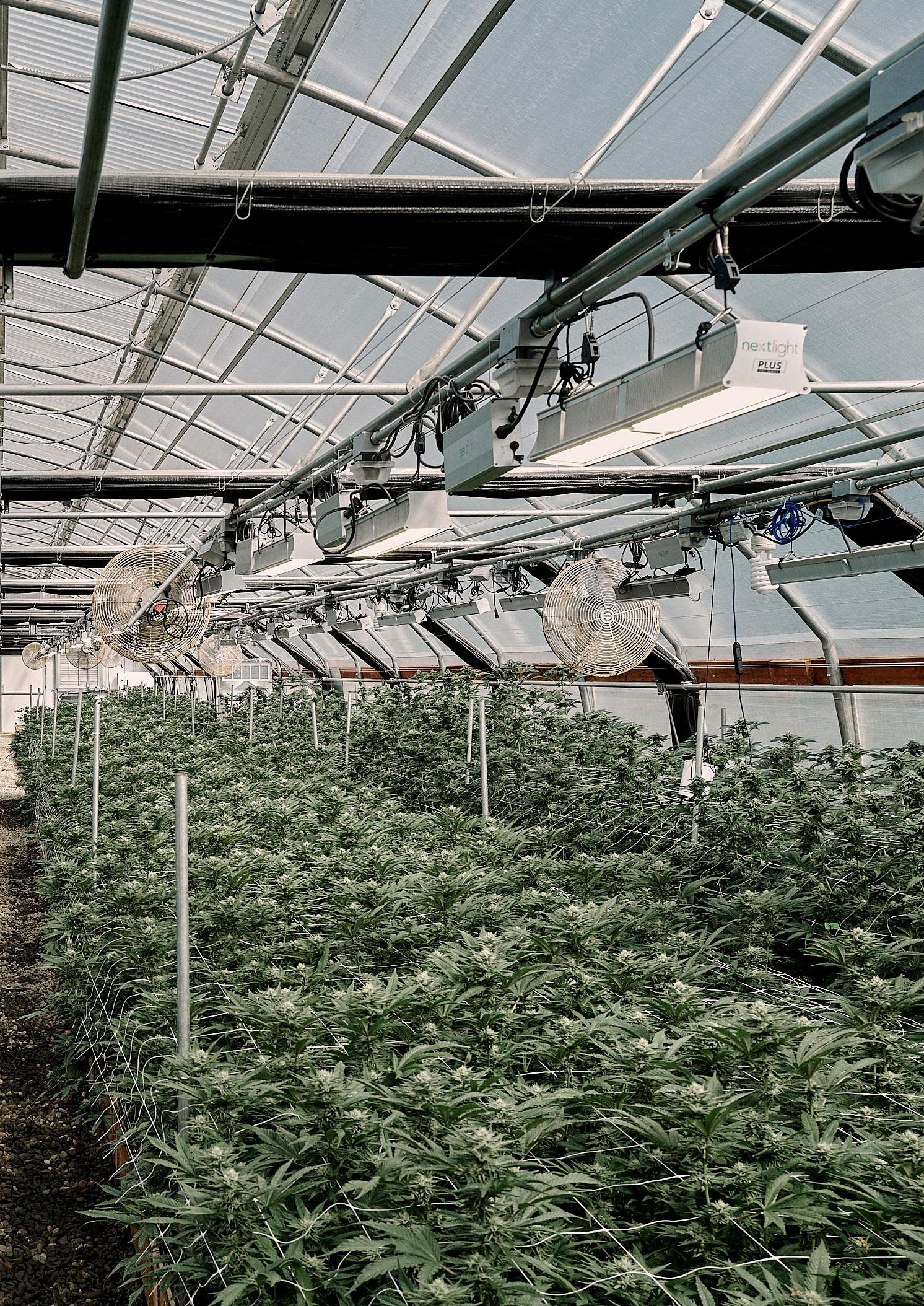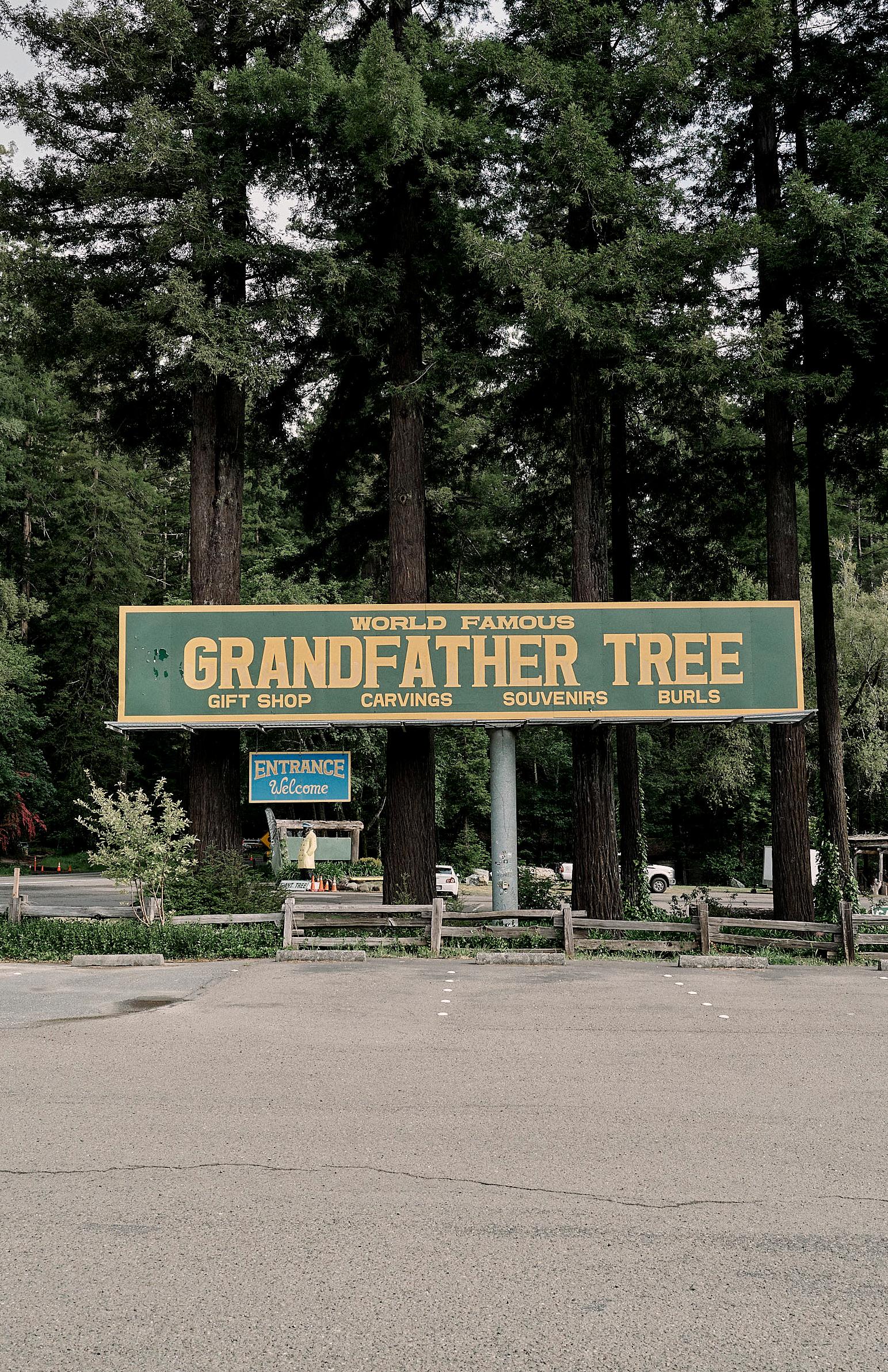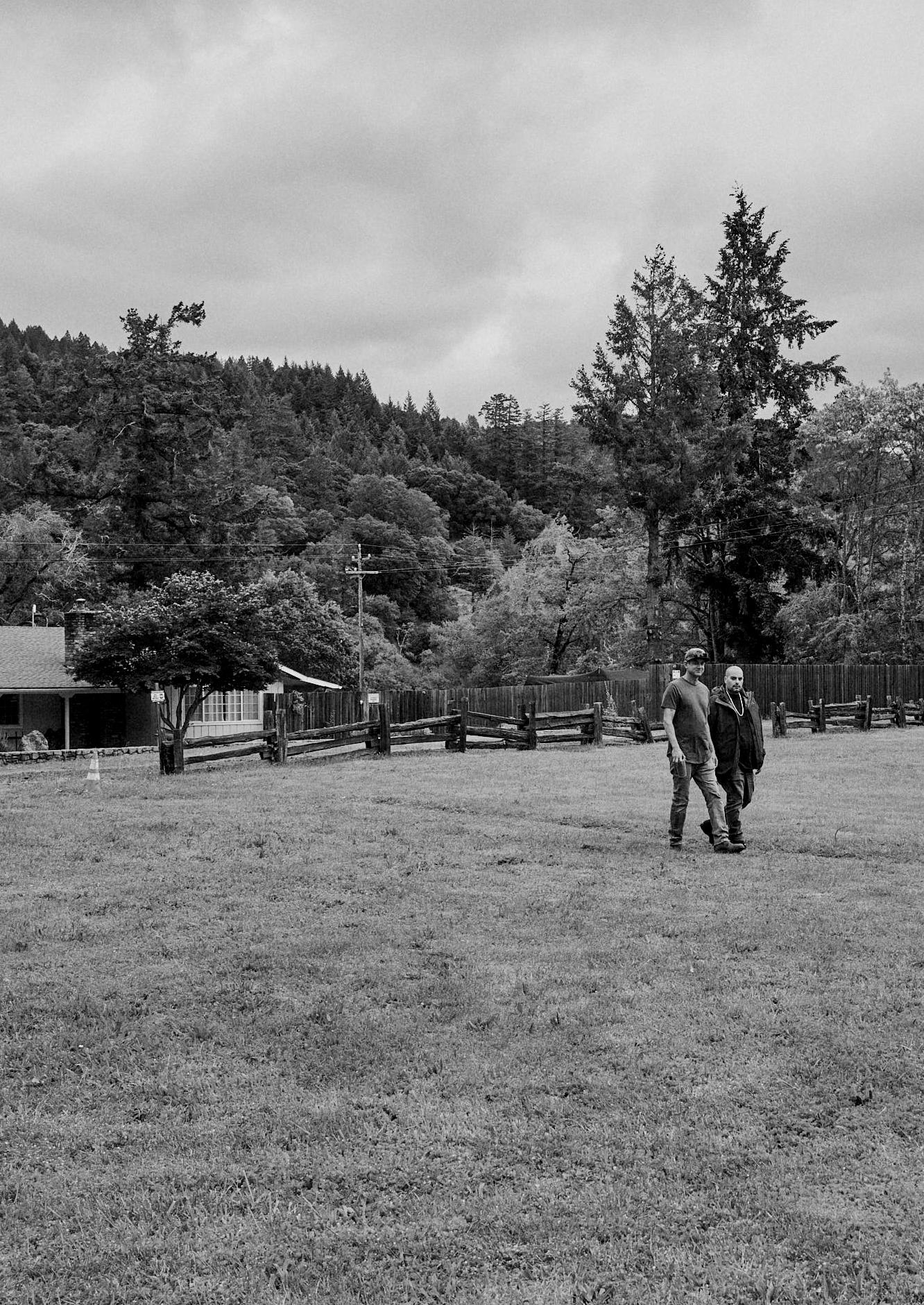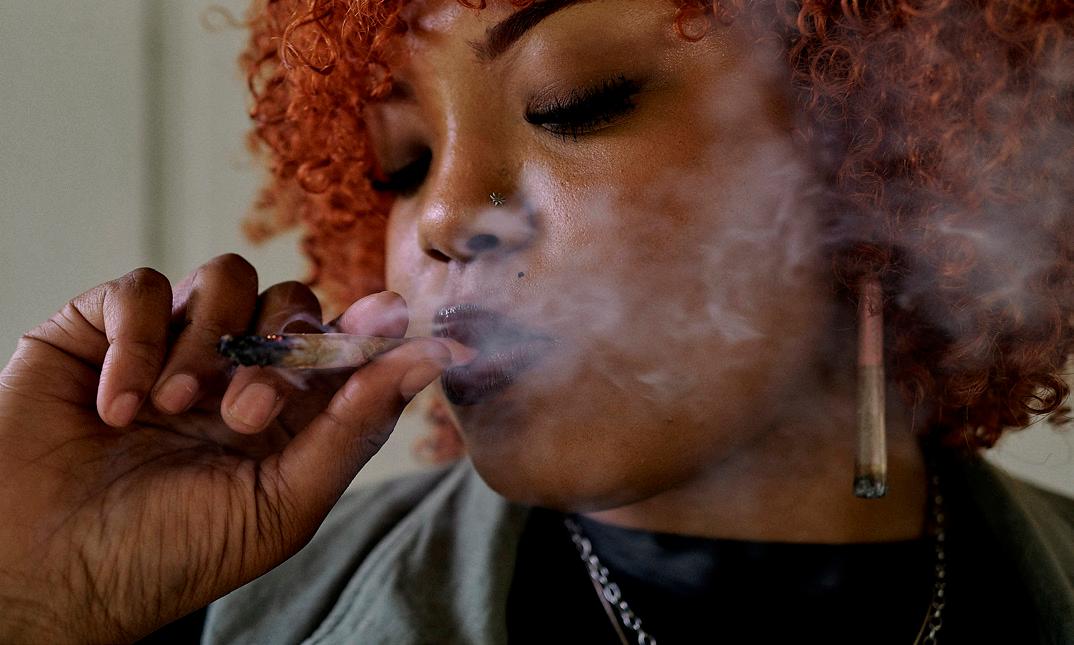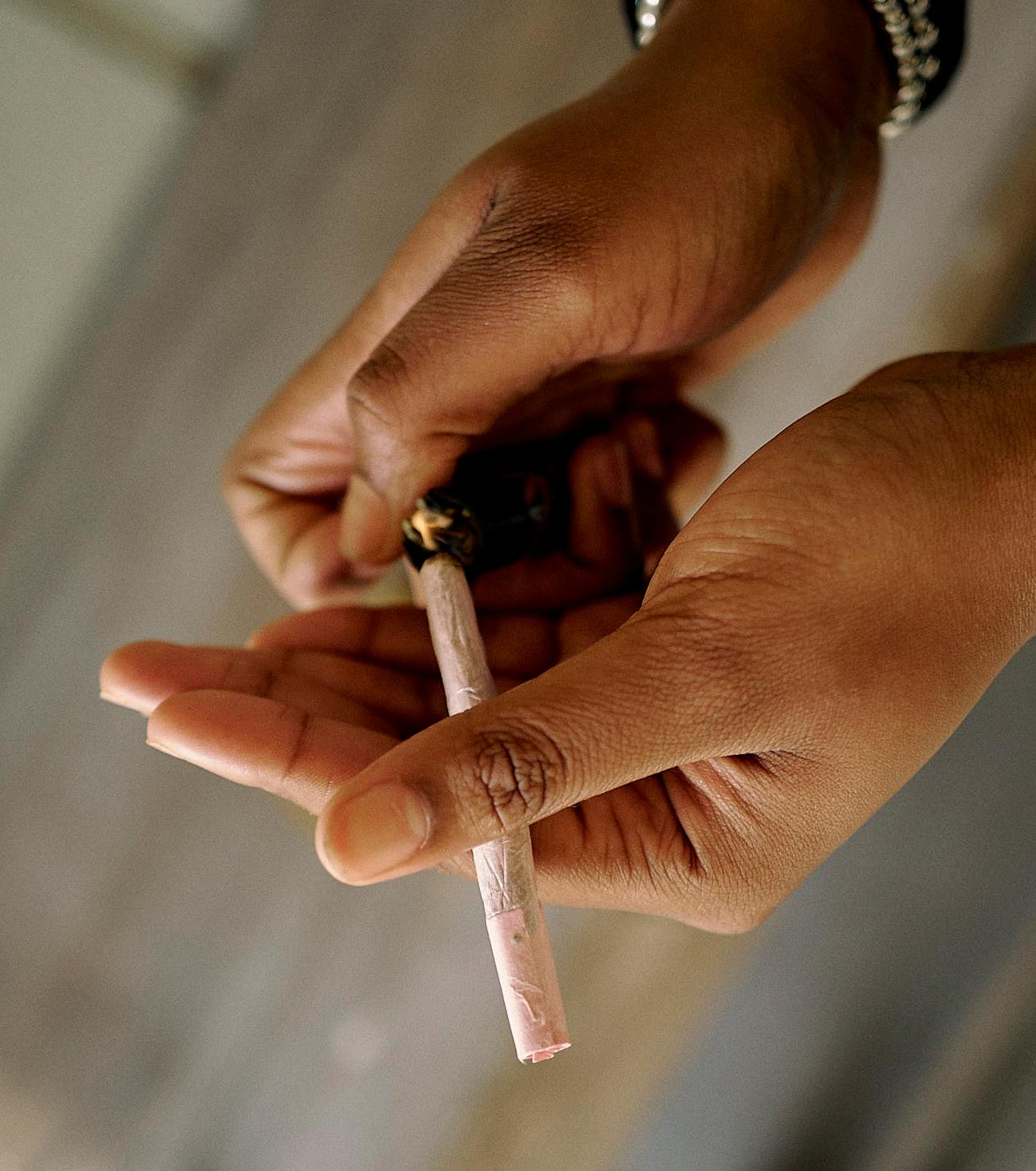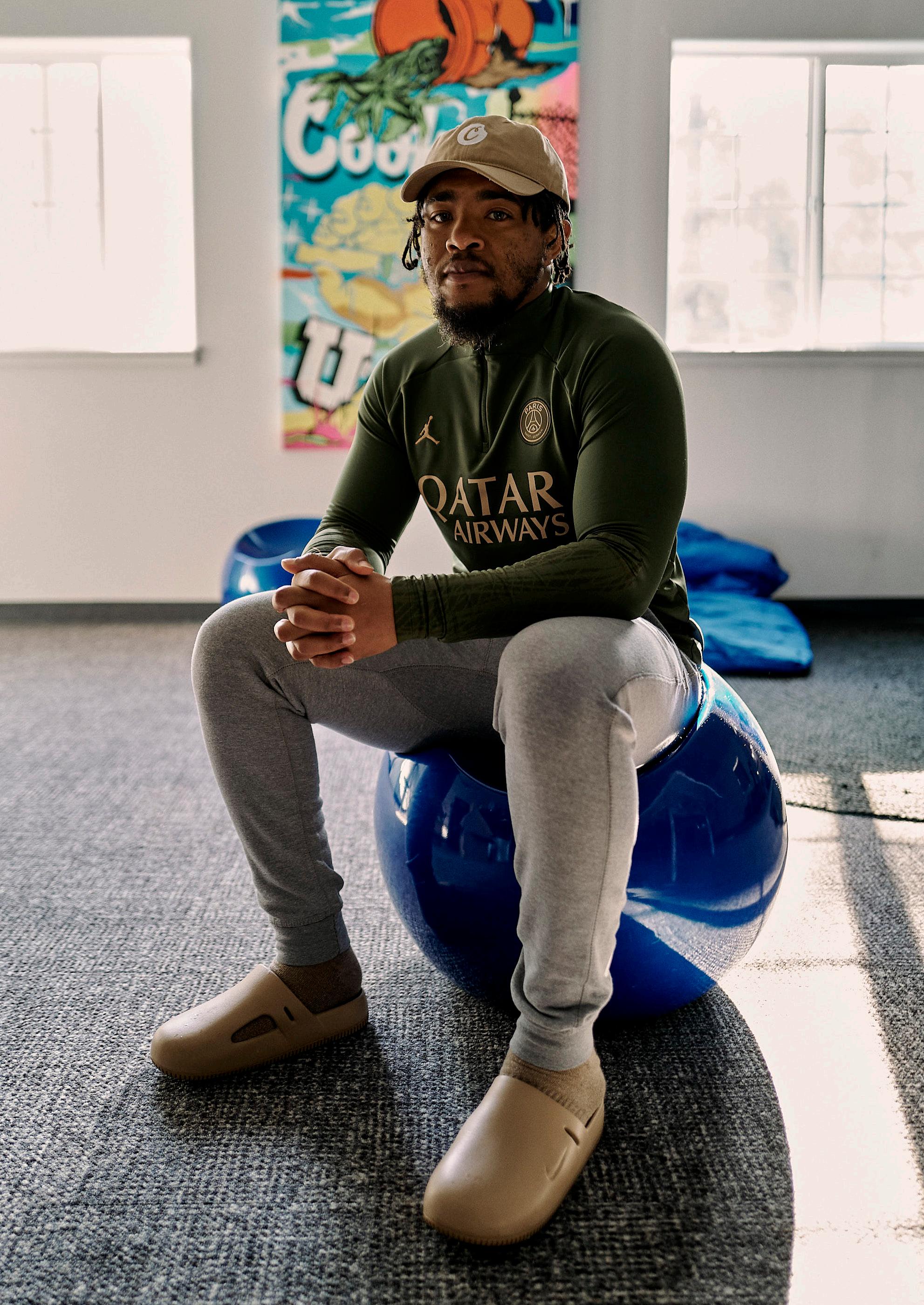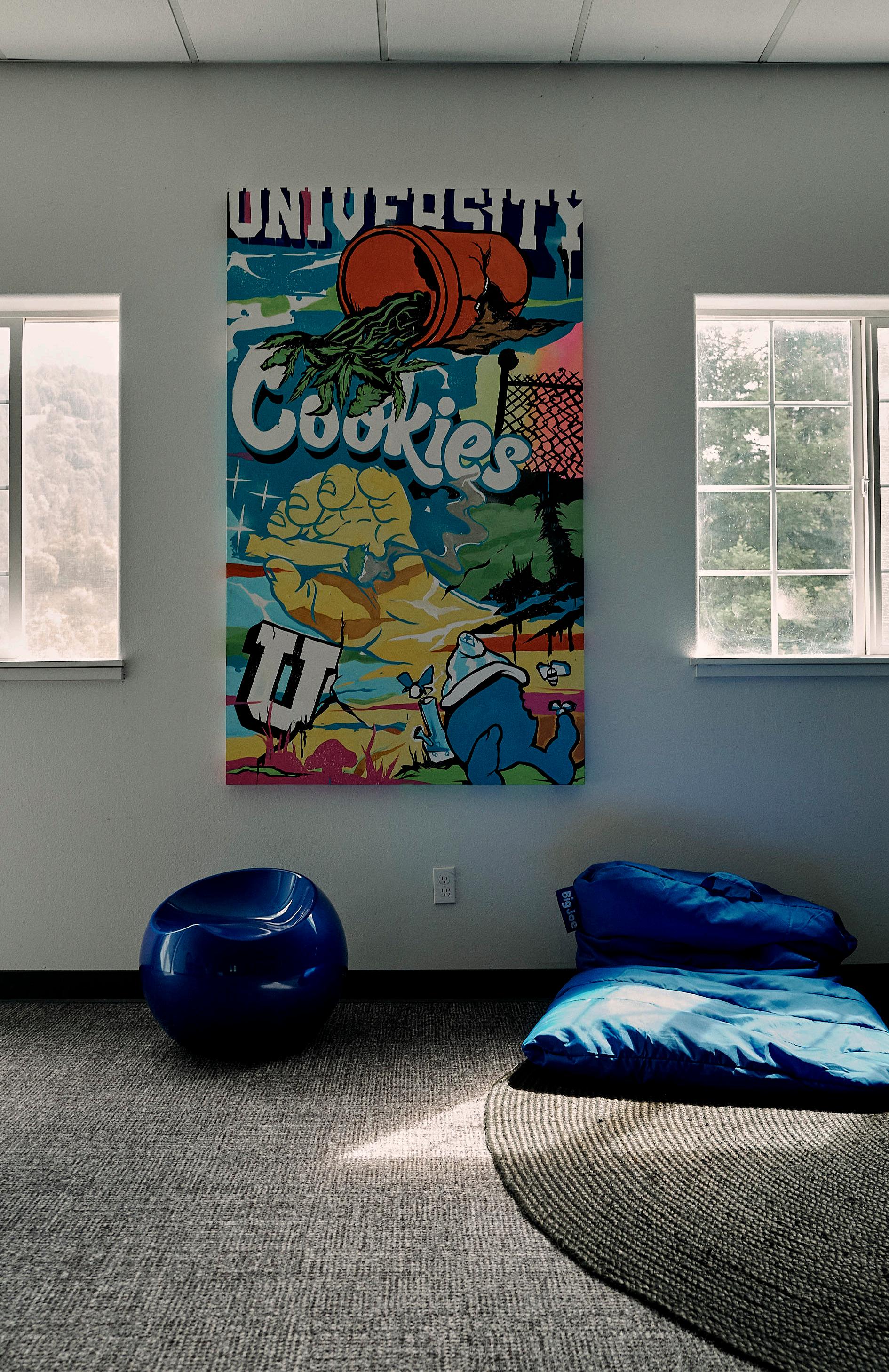Cookies University + AROYA
As a proud sponsor of Cookies University 2024, AROYA’s Director of Applied Technology Jason Van Leuven headed up to Humboldt to deliver two days of instruction covering plant science, cultivation, and crop steering. For the second year in a row, AROYA offered each student a partial scholarship, their own SOLUS three-in-one sensor (to monitor EC, moisture content, and temperature), and a deep dive into data-driven cultivation from one of the most sought-after agronomic experts in the field. This partnership was formed out of mutual respect and a desire to promote education, empowerment, and equal opportunities for underrepresented communities in the cannabis sector.
AROYA congratulates Cookies University Class of 2024!
Jillian A.
Age: 37
New York, NY
@ms.jillyjillz
I was born and raised in Spanish Harlem and I’m currently in the Lower East Side.
I’m a special education teacher, I teach middle school. I teach my son, who is in 6th grade. I’m big into the bike life community.
I started smoking as a teacher, as an adult, to help with overthinking so that when it was time to go to sleep my brain could shut down.
When cannabis went legal in New York, I started researching schools because I wanted to learn. A lot of online schools are super expensive, so I started looking into social equity, and I came across an article about Cookies U. I started following on social media and Berner put out an application to work for Cookies in New York. So I applied and wound up getting picked. Started as a sales rep, [then] visual lead to a general manager in four months. I was so crazy about the fact that they’re putting people in position who’ve been impacted and marginalized by the criminalization of cannabis. I still can’t believe I’m here.
There’s so many legacy operators in New York; to put that game onto the people who don’t know the business side, that’s the most important part for me. Big companies have the advantage of the capital and the business knowledge. We got the hustle, we got the finesse behind the scenes, but we gotta match that.
I’m big on mental health. I lost my brother to suicide; he was off his meds. Every pharmaceutical anti-anxiety or antidepressant medicine, the side effects are always worse. We have an alternative, but our marginalized communities are not in the research on the people who use it. We’re not even using the full effect of the plant. It’s not just about THC. Being here opened my mind to topical creams – I never thought about stuff like that.
There’s so much that this plant does to heal. The hype is cool, the parties are cool, but we got people in this country still in jail. We still have people who are sick and don’t have access to the plant.
I spent the whole summer reading the Grow Bible. Then I invested in a tent, started with the soil and just trying to figure it out trial and error, taking care of my babies. Once I open up the tent I’m focused, I’m using my hands, I have the music to calm me down. It’s a zen thing for me.
The science is awesome and it definitely gave me a different perspective. I intuitively was trying to feel my plant out, but now I can see scientifically what it needs. Having a better understanding of the foundational stuff, I feel more confident and I’m even more excited to see how I’m gonna develop my plants. That’s the battery in my back: to go home, get some nutrients, use the [SOLUS] to see if I’m overdoing it.
“The science is awesome and it definitely gave me a different perspective.”
Sydney R. Dallas, TX
Age: 24 @sydthebudtender
When I was in Dallas, I was working with Ground Game, helping them decriminalize marijuana. I also was illegally selling marijuana, so that’s why I was so big on trying to join them. And then I also was working as a budtender at another dispensary in Dallas [selling] delta-8, THCA – so, hemp flower.
Ground Game, they’re partnering with the government, trying to get people to sign a petition to decriminalize marijuana. So I would just be out holding a sign like, “Do you want to sign the petition?” I was definitely trying to get into that so I can be a help to Dallas so we can move on with legalization, but decriminalize it first.
My big brother has always been a Berner fan. So growing up I always knew about Berner, and then when Cookies came around, my brother would be talking about Cookies and hyping it up. I really look up to him, so I’d just copy everything he did and that’s how I found out about Cookies U. I was like, this is something I want to be a part of.
I applied last year and got Top Ten but I didn’t get in. When I applied again this year, I was number six and I didn’t get in, but someone dropped out. Amanda called me and was like, “You’re coming now.” It felt like it was meant to be. It’s been amazing to come from a big city and to be in Humboldt – it’s just so beautiful out here.
Feeling very blessed and I’m so thankful.
I’m pretty familiar with retail, but I really enjoyed the greenhouse. I want to learn more about being in the nursery and definitely cultivation. I’m most curious about how it comes together. In the greenhouse, I was able to see the plant already fully grown, so I just want to see more [of] the beginning stages.
I had seeds in Texas, but I’m just so scared to do that. The wrong person [could] come in my apartment and snitch, so I just always steered away from that. That’s why I’m trying to get out of Texas, I want to be in a safe area.
[Two days of instruction from AROYA] was overwhelming in a good way. It was like, “Oh, wow, this is what goes into a plant.” I was very interested to see how the AROYA system goes hand-in-hand with the crop steering and how you’re able to keep track of that. I haven’t really had any hands-on experience, but now that I have the SOLUS, I’m very interested to tap into that. It’s influenced me to get into cultivation because I wasn’t interested in it honestly. But seeing everything and hearing Jason talk to us about it has definitely made me want to get into cultivation.
“Seeing everything and hearing Jason talk to us about [AROYA] has definitely made me want to get into cultivation.”
My dream is to host events for more people in my community, Black and brown people, to feel comfortable. I just want to have more events centered around my people so that they can feel comfortable to come, learn more about cannabis, and try to change the stigma around it. But my ultimate goal is to have my own dispensary or consumption lounge. I also want to do my own podcast talking about cannabis, so look out for Strain Talks with Syd.
SYDNEY R.
Brian M.
South Carolina native
living in VA
Age: 31
@iam_b_mitch
I’m originally from South Carolina but relocated to Virginia for the industry.
I work with the local master gardener group helping them do charity projects around the city. We do community cleanups planting perennials, biennials, and cleaning up the garden of the college [where] we volunteer.
I have a master’s in Medical Cannabis Science and therapeutics from the University of Maryland; I was in the inaugural class. They go from prohibition to current laws and everything in between, like pharmacology, formulations of medical cannabis products, how the drug reacts to the body, how the body reacts to the drug. It was pretty in-depth.
There was really no job opportunities with the degree; in South Carolina, you need an educational background to even have that discussion with people. So I did that program and was looking for something plant-touching, and there was nothing in a legalized market.
I have known Amanda since 2019. She set up for me to come out and tour one of the partner brands. I even tried to get into the first cohort, but it was only open to California residents. I just kept applying and I ended up getting in.
I love growing plants. It’s therapeutic, and it’s also said to be therapeutic for veterans dealing with PTSD. I’ve been deployed…so that was one of my driving forces, trying to
get veterans access to the medicine and access to planttouching, which is not legal in a lot of states. It gives you a sense of completion when you grow your own medicine, so I would like to provide that for people.
The different techniques of watering causes [the plant] to do different things, like node spacing – I didn’t know that irrigation was the determining factor. I thought it was maybe nutrients or something else.
Everybody’s trying to get the plants to do the most that they can. Data-driven science that you can give to other people and say, “This is what I’m doing,” and implement it right then, that’s pretty cool! Being able to look at numbers, seeing how the plant responds – like okay, this needs to be adjusted because this is not producing what it should – and taking some of the guesswork out of that, it’s been the most impactful.
Jason talked about a facility in Washington that was using AROYA – just hearing that a 5000-square-foot farm could survive in a commercial climate was cool. That means somebody’s doing something right, so I definitely want to implement that in the greenhouse.
I’m excited about AROYA, the monitoring systems, calculations for nutrients, all of it. I haven’t seen anybody talking about crop steering on the East Coast. I know it’s in commercial ag, but I’ve seen nobody talking about
the amount of water and pushing in certain phases and certain stages. Nobody’s been discussing that on farms or anything, so I definitely think that’ll provide an advantage. I would like to cultivate the plant to the best of its ability.
Virginia is still waiting on the recreational market, but they’re pushing for legalization, and they have great social equity on paper. I would like to apply for the social equity cannabis license, micro business – 10,000 square feet – and get it moving. I wanna grow. And then after I grow, I would like to learn and produce multiple strands for someone else before I create my own.
I’m enjoying myself. Being fully immersed in cannabis and cultivation in all aspects, it’s been a blessing.
BRIAN M.
“I haven’t seen anybody talking about crop steering on the East Coast... so I definitely think that’ll provide an advantage.”
Vicky J. PG County, Maryland
Age: 29
@buddaflyeffects
I was born in Maryland. Out there, I mostly studied journalism, writing, and media.
I’ve been consuming cannabis since I was in high school. Around 2020 is when I started Buddafly Effects, my own cannabis brand focusing on educating and helping people to be more comfortable with cannabis [and] know more about it outside of just being high.
I’m in the legacy side of cannabis, so I wanted an experience that will help me see cannabis on the licensed side and provide me the education, the tools, and the people that will help me elevate in cannabis. I was surprised [to be selected]. It just felt like everything was aligning.
I’ve been cultivating for three years. I felt like the people who I was getting cannabis from, they weren’t being honest. There wasn’t integrity – they’ll say it’s this, but it’s really that. I just felt that disconnection, so I was like, okay, I want to understand cannabis better. I want to find genetics and strains that match my preferences and what I need and know that it really is that. So I started connecting with the right people in my community in the DMV area, other growers. Once I went from just consuming to growing it, I started understanding the plant in a whole different way.
I know how to grow at a very small scale. I’m in the lottery right now in Maryland to get my license. What I’m doing now is good, but coming here and seeing the bigger greenhouse is something I wanted to learn. Growing indoors is expensive, and outdoor on the East Coast is not really where I’m at. So I think the mix of the two will be the best.
Coming from the legacy side, the more I learned about commercial cannabis, I feel like it’s more about the numbers – that’s going to be a big adjustment for me. I still want to cultivate, but I’m just realizing that moving into that commercial market, I might have to let go of some of the things I like to do. Like growing in living soil, it’s not industry popular.
I like to listen to what the problems are from the people who are in there, and see if I can be part of the future. So trying to understand how to take the information and transform that into what I do, I feel like that’s been on my radar: what things can I change and advocate for, what things can I innovate? That’s something that I didn’t know before coming here that I was even interested in: how can we make living soil more mainstream?
I’m going to find more ways to be more efficient. I’ve already been doing the basic environment controls.
I want to implement more technology into my growing style. We have some things that are automated, but we don’t have drip systems, we don’t have AROYA. Something that surprised me [was] realizing that people were using technology that particular. I didn’t know that you’re able to dial-in to that level and create an actual recipe. I was doing traditional things like lifting a pot and seeing if it’s too heavy – the [SOLUS] sensor makes more sense because it’s more accurate and more consistent. I want to be in that middle ground where technology and traditional growing meet, I want to use everything I learned to be more efficient.
“I want to be in that middle ground where technology and traditional growing meet.”
VICKY J.
Yancy M.
Buffalo, NY
Age: 44
@morningcloudscafe
Right now I’m working at a dispensary called Dank. It’s the first legal dispensary in Buffalo. The owner actually did seven years in prison for weed, so he was the first one to open up in Buffalo.
I heard about [Cookies U] through my sister about a year, year-and-a-half ago. In January, I’d seen a post from Cookies Social Impact about the applications opening up, so I decided to fill it out. Didn’t ever expect that I would make it – I thought it was fake at first – but definitely glad I did. Divine intervention.
I know a pretty good amount of stuff. I’ve been doing infusions for about ten years, grew on and off for about 15 years, but I’m definitely willing to learn everything. Before the dispensary, I was helping out in an illegal greenhouse. They were selling plants to the reservation; in New York state the reservations can sell whatever they want, so that’s where I got some of my growing skills.
There’s a girl, her name was Natalie. I called her my G. She was born without a liver, and she was on dialysis all the time, so she was doing really bad. When I first met her and her mom, she pretty much got me into the infusions because she wasn’t eating, she didn’t have a good life. So being able to make her gummies helped her out, that’s what really got me into it. And then working at the dispensary, helping people out and they come back saying, “Hey, what you recommended helped me sleep,
helped me with my pain”, that feels really good. Really taking care of the plant, going from a seed to actually harvesting it, curing it, and then smoking it – it’s like a ritual. From the beginning to the end, you see what you grew and you actually get to taste what you grew. It’s a good feeling.
[Two days with AROYA was] really informative, especially with the sensors and how much they help to grow. The way the plant acts and how it lives and thrives is much different than what I thought. There’s more scientific stuff that goes into it. Like EC, as far as what it should be, I thought it’d be much lower. Working at the greenhouse, we’ve been doing EC and ppm’s and all that just from listening to different YouTube videos. Like, you could watch hours-long videos and pick up one thing. Nothing compares to this program. It’s definitely life-changing.
[My dream] is just to provide for the family and live comfortably – not rich, just comfortable. I actually own a couple lots back home. My whole plan was to get a bunch of trailers, put them on the lot, and then rent them out for people that want to visit Buffalo. Or if they gotta stay in a hotel but they can’t smoke, they could rent it out for an hour or two. I’d have bud there they can smoke, then have maybe some plants growing so people can see the buds blooming during certain times of the year. Maybe even during harvest time, they could actually help harvest. AROYA X COOKIES U
Maybe do an infused, members-only Airbnb-type thing, like over here at Cookies U, how the tiny homes are. For somebody to come in and rent one of the tiny homes, live there, and then every night maybe do a dinner so that everybody could come and, you know, talk and eat. The experience of being able to smoke good bud [that] a hundred percent nobody else has, taking it back to the plant – like, most people don’t experience the plant. I think that’ll be a good money-maker.
“The way the plant acts and how it lives and thrives is much different than what I thought. There’s more scientific stuff that goes into it.”
YANCY M.
“Cookies U is a huge accomplishment. I’m so proud of it, and I’m so proud of the people that have come through and put in the work.”
When Amanda Friedman, 39, hopped on her Ducati Monster in her early twenties to escape the “crazy stuff” of her Washington upbringing, the vision for a new life in South America was taking shape. Her sights set on taking a practice run to Mexico from up north, Amanda figured she’d stop for a rest 12 hours in, placing her in Humboldt. A cousin she’d connected with on Facebook lived there and, though they’d spent little time together, had agreed to let Amanda stay. Knowing what the region was famous for, Amanda asked the day after her arrival if her cousin worked in weed. She confirmed as much, saying the entire operation was temporarily shut down for Amanda’s visit, but she was welcome to swing by on her way back to check it out. Taking her cousin up on the invitation, Amanda later returned to Humboldt County where she’d end up setting down roots and working in the underground cannabis economy.
As Cookies’ Director of Social Impact, Amanda has been integral to Cookies University from the start. We sat down with Amanda to hear about her entry into Humboldt, how she connected with Cookies, and the opportunities and collaboration that led to the development of this groundbreaking program.
What drew you to Humboldt County?
You have the peace of nature, but the whole community here just ran on their own time. They made their own economy, they set their own rules. It was just dipping into an underground subculture that to me, was so interesting. Like with ethnography, where you just go live amongst the people and learn all their customs. I felt that way coming to Humboldt; it was just dropping into a different world.
The community was totally based around the cannabis economy, which was really cool to see. The community relied on each other, and life went on the cycle of the plant: it was very busy and thriving here during the grow season, dead in the winter when harvest is over. Having a whole community based around a plant was so cool.
Shortly after recreation passed, like 2016–2017, so many people did try to go for a license. With all the hill farms, there was so much required of them. Like, if the people that they bought the property from had cut down trees or diverted streams, they had to do restoration. A lot of people did get through that, got permitted, and entered the recreational market, but so many just haven’t been able to make ends meet. It’s turning a little bit into a ghost town around here.
How did you get connected with Cookies?
I’ve never wanted to work in a corporate space and couldn’t imagine how living in the woods by the cycles of the plant, which I loved, was going to translate into a regulated market. I did community college in Humboldt, then got into UPenn so I was spending winters in Philadelphia, which allowed me to be here for the grow season and harvest, make money, and then go back to school. I did that until I graduated, then I planned to go into social work, get my master’s, and get out of the industry.
That’s when a couple friends asked me to set up a warehouse for them, turn it into a compliant facility. So I printed out the temporary regulations and set up the facility according to what the regs said. Through that, they sent a friend who was setting up a distribution license and wanted my advice. [One Log Co-Founder] Peter Huson came to the warehouse and started showing me his blueprints for a distribution facility. I remember telling him that I had no idea what I was doing, and he was like, “That’s okay, this is all new, nobody does”. We just really hit it off. He asked me to come to One Log, the site he was working on, and he had a group of partners that included [One Log Co-Founder and Cookies President] Parker Berling, [One Log Co-Founder and Cookies CFO] Ian Habenicht, and [Cookies GM of Humboldt Operations]
Jonah Carrington. So I started working at One Log, and it was the first time I really shifted into getting to work on the whole supply chain in the regulated format.
I learned the regulations for all the different license types, how product would flow from one license to the other, and what all the rules were, which helped me understand the whole framework of the regulated industry. The team here gave me an opportunity to try out different things and see where I wanted to point myself.
What inspired Cookies University?
When I was ready to “graduate” from One Log and get out of Humboldt for the first time in 13-14 years, both Peter and Parker offered me roles. At [cannabis software startup] Backbone, I started working in customer success and eventually built out a professional services department. Parker asked me about Cookies and I was like, “I don’t know anything about marketing or branding. I don’t know what I would do there.” I remember this moment vividly because it changed my life: I was trimming weed at One Log, and he sat down and asked me, “Well, what do you want to do?” And I was like, “I really want to work towards social equity. I don’t want to keep being in this industry if it’s just some rich white men getting richer, that does not call to me.” And he’s like, “Okay, let’s make a job for that”.
This led to me building out the social impact program.
I was introduced to [Social Impact Consultant] Richard Ng, he is a wealth of knowledge and he connected me with so many of the leaders in the advocacy and nonprofit space. The way we went at it was just interviewing everybody doing anything meaningful in cannabis on that side of things: what are you doing, what’s working well, what do you need?
Some organizations replicated what smaller grassroots groups were doing, but sucked up a lot of the attention and funding, so we wanted to make sure we were being additive to the ecosystem and letting the community guide us. We heard from these groups they needed funding, hands-on education, and anything we could share from experts at Cookies doing workshops. A huge gap was access to plant-touching education. It became so clear in those conversations that what Cookies’ social impact structure should be is providing funding for nonprofits that were already doing the work, being a silent partner behind them, and allowing them to build up their capacity to help even more people because they’re already doing a great job. Then the workforce development side seemed like a no-brainer because I had just spent all that time at One Log learning for myself how to get through the regulated supply chain.
So that just clicked. Plus, it’s also bringing people to
the Emerald Triangle, the cannabis mecca of the world. Berner and Parker greenlit the idea so Jonah set up tiny homes on the property. I spent a long time building out the program infrastructure, what our curriculum is, and all that it would entail. The fact that Jonah and Parker let me set up a school right in the middle of all these operational cannabis businesses says a lot about how much the leadership at Cookies and One Log cares about this initiative.
We were preparing to launch in early 2020, then COVID hit. We took a pause and did a soft launch in 2021 at a partner operation for people in LA, and just focused on cultivation and compliance. We did the first Humboldt, full immersion supply chain cohort in 2022.
So how would you describe Cookies University?
The best hands-on plant-touching cannabis education in the world. I truly feel that way. The whole goal is to provide access to education – plant-touching education, in particular – to people coming from communities that have been historically marginalized and face more barriers of entry into the industry. The program isn’t open to just anyone; it’s not something you can pay to get into or know the right people to get into. It’s specifically built as a social equity initiative, so you have to qualify under equity criteria.
I didn’t realize all the jobs that existed in the regulated industry, I just knew about hill farms where you can be a driver, you can be a trimmer, or you can be a farmer. In the regulated space there are all these new jobs, like compliance expert. The program is all about exposure. Many people come through thinking they’re interested in cultivation, but after working in a larger-scale production facility instead of a hobby grow they realize, “Oh no, that’s not the environment I want to be in day in and day out.” Or vice versa: people who think they wouldn’t be good at cultivation end up falling in love with being around the plants. They get to talk to different team members at Cookies, a lot of our partners, and people in Humboldt with families that have been in this work for multiple generations. It’s a mix of classroom-style seminars or workshops, and then plant-touching work in different operational licenses.
What’s the process to get in?
It’s a very long process. We open up applications after the current program ends for people to submit online. We have a very limited amount of spots and a lot of applications, so it takes quite a while to go through and score every application. The top 100 will move forward to the next round where we are asking different questions and they need to submit a video. After that, they get scored and narrowed down to the top twenty-five where we do interviews and a reference check. From there we narrow it down to the top five.
We’re looking for who has a lot of passion for the plant and who’s gonna thrive in this environment. A lot of people who think this would be a dream scenario might not be thinking realistically about how much work it entails. It’s not a cannabis vacation, it’s a lot of hard work. Humboldt can feel isolating, so if you have trouble integrating with the group and being a supportive team member, this might be a difficult environment.
I know how hard it is to focus on your studies if you’re stressed out financially, so we want to remove that from the equation. Anyone who gets in fills out a financial aid questionnaire – what bills are you responsible for at home for the two months that you’re in this program – and so far we’ve been able to cover 100% of whatever need there is. They receive a weekly stipend for groceries, and we do a rental car and cover the gas. They’re also earning a wage, so whether in the classroom or doing the hands-on work in the licenses, they’re making $16 an hour.
What’s your vision for the future of Cookies University?
I know Parker and Berner want to provide this opportunity to more people. We need to expand it and scale it up. Now that we’ve tested the model and done it on this scale, we know what works and what doesn’t. I would like to continue having our Humboldt campus as our flagship. But we have a lot of great partners that could be campuses in different parts of the country, even the world. In Humboldt, our One Log campus is amazing for access to the full supply chain. Graduates from the Humboldt campus may want to dive into indoor cultivation or distribution and logistics, and I would love to be able to send them onto their next phase of development, like a master’s program.
Cookies U is a huge accomplishment. I’m so proud of it, and I’m so proud of the people that have come through and put in the work, that has been incredible to see. The supportive environment across the Impact team with the One Log team, everybody working together towards a shared vision – super proud of that.
Credits
Cookies University Instructor Jason Van Leuven, Director of Applied Technology, AROYA
Design Britani Phelps, Senior Graphic Designer, AROYA
Photography Christian Hertel, VP of Corporate Marketing, AROYA
Writing/Editing Kaisha-Dyan McMillan, Senior Content Manager, AROYA
Thanks to the Amazing Team at One Log:
Cookies GM of Humboldt Operations
Jonah Carrington
One Log Co-Founder/Cookies U Instructor
Kevin Jodrey
Facilities Manager
Delbert Chumley
Cultivation Manager
Iraj Lopez
The Magnificent Tucker
CONTACT
AROYA, INC.
1300 Henley Ct Pullman WA 99163
AROYA.io
COOKIES U
Humbolt County CA impact.cookies.co
References
1. Lee, Juhohn. “America has spent over a trillion dollars fighting the war on drugs. 50 years later, drug use in the U.S. is climbing again.” CNBC, 21 June 2021, https://www.cnbc. com/2021/06/17/the-us-hasspent-over-a-trillion-dollarsfighting-war-on-drugs.html
2. “Drug War Stats.” Drug Policy Alliance, https://drugpolicy.org/ drug-war-stats/. Accessed 1 June 2024. https://drugpolicy.org/ drug-war-stats/
3. “Most Americans now live in a legal marijuana state – and most have at least one dispensary in their county” Pew Research Center, Washington, D.C. (29 February 2024). https://pewrsr. ch/3uJfiBR
4. “A Tale of Two Countries: Racially Targeted Arrests in the Era of Marijuana Reform” ACLU, American Civil Liberties Union, 17 April 2020, https://www.aclu. org/news/criminal-law-reform/ a-tale-of-two-countries-raciallytargeted-arrests-in-the-era-ofmarijuana-reform. Accessed 1 June 2024.
5. “Cannabis Equity Program.” City of Oakland, https://www. oaklandca.gov/topics/equityprogram.
6. 2022 Social Impact Report, Cookies
Copyright © 2024 AROYA, Inc. All rights reserved. Interviews were edited for length and clarity.
No part of the publication may be reproduced without permission from the publishers.



